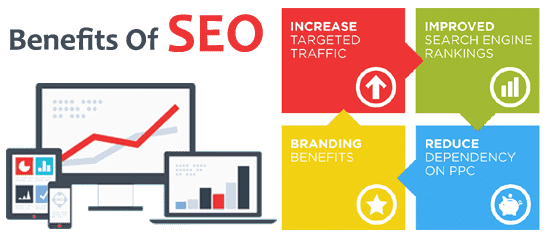Are you a beginner in the world of e-commerce SEO? Looking to get your business noticed online and make sure it’s at the top of search results? SEO can seem like an intimidating topic, with all the rules and nuances to learn. Fortunately, our e-commerce SEO beginners guide is here as a helpful resource for those just getting started.
We’ll help you understand how exactly search engine optimization works, break down some important basics that are key to success, and provide useful tips on how you can optimize your website for increased visibility. So, if you want to jumpstart your knowledge and experience with e-commerce SEO – read on!
Introducing eCommerce SEO
eCommerce SEO, short for Search Engine Optimization, is the strategic process of enhancing your online store’s visibility in the search engine rankings. When utilized effectively, it can significantly increase organic traffic to your website, which, in turn, can boost your sales and revenue.
SEO is the art and science of persuading search engines like Google, Bing, and Yahoo that your website is a credible and relevant source for your targeted keywords, which are the words or phrases people are likely to use when looking for the products you offer.
A crucial aspect of eCommerce SEO is ensuring that your site has a well-structured, easy-to-navigate design. This not only improves user experience but also makes it easier for search engines to crawl and index your website.
Other fundamental elements include keyword research, on-page optimization (including meta tags, URLs, and alt tags), link building, and content creation.
Whether you’re selling artisan coffee beans or high-end fashion apparel, eCommerce SEO is not just about attracting traffic—it’s about attracting the right kind of traffic. It’s about reaching the shoppers who are most likely to buy your products and turning them into customers.
Understanding How SEO Works

Understanding how SEO works is critical in formulating an effective eCommerce SEO strategy. At its core, SEO is about relevancy and authority. Search engines assess these factors based on a complex algorithm that takes into account hundreds of ranking signals.
Firstly, search engines send out ‘crawlers’ or ‘spiders’ to explore the web. These automated bots visit websites and read their Content, making note of key information such as the site’s structure, the Content on the pages, and the links between them.
One key factor in relevancy is the use of keywords – these are the terms that searchers type into search engines. By ensuring these keywords appear in the right places on your website, you can signal to search engines what your site is about and which searches it’s relevant to.
The authority of your site is determined by the number and quality of other sites that link to it (known as backlinks). The more high-quality backlinks your site has, the more authoritative search engines perceive it to be.
In a nutshell, effective eCommerce SEO involves optimizing your site so that it’s relevant to your target keywords and building its authority so that it stands out against the competition in search engine rankings. Understanding this is the first step in your eCommerce SEO journey.
Key Basics of eCommerce SEO
To implement effective eCommerce SEO, it’s essential to grasp a few key basics.
Keyword Research
Keyword research is the cornerstone of SEO. It involves identifying the search terms that potential customers use when looking for products or services like yours. Incorporating these keywords into your website Content helps your site appear in relevant search results.
On-Page SEO
On-page SEO refers to the optimization of elements on your website that you control. This includes your site’s Content, HTML, meta descriptions, title tags, and image alt texts. Each element should be optimized with relevant keywords to improve your site’s search engine visibility.
Off-Page SEO
Off-page SEO relates to actions taken outside of your website to impact your site’s trustworthiness and authority by building the right inbound links and social signals.
Technical SEO
Technical SEO involves optimizing your site’s infrastructure, such as site speed, mobile-friendliness, indexing, crawlability, site architecture, and security. These factors significantly affect your site’s SEO performance.
Content Marketing
Content is the key to engaging your audience and driving them towards conversion. Regularly posting high-quality Content optimized with your target keywords not only enhances your SEO but also helps to establish your brand as an authority in your industry.
User Experience (UX)
Search engines prioritize sites that provide excellent user experiences. Aspects of UX that affect SEO include site design, site navigation, site speed, and mobile optimization.
By understanding these key basics, you will be well-equipped to start on your eCommerce SEO journey. Remember, SEO is not a one-time task but an ongoing process requiring regular monitoring and adjustments. It takes time to see results, but with consistent effort and following best practices, you can improve your site’s search engine visibility and drive more traffic to your eCommerce store.
Why is eCommerce SEO important for your business
eCommerce SEO is crucial for your business for a myriad of reasons. Foremost among these is visibility. In an online marketplace teeming with competition, SEO helps your eCommerce store stand out and reach potential customers who are actively searching for the products or services you offer.
It works by aligning your website’s Content with the search terms or keywords your target audience uses, thereby increasing the likelihood of your site appearing in search engine results.
In addition, eCommerce SEO is a cost-effective marketing strategy. While pay-per-click (PPC) campaigns and other forms of online advertising require ongoing investment, the organic traffic generated by sound SEO practices is virtually free. Over the long term, this can result in significantly lower customer acquisition costs.
Furthermore, a well-optimized eCommerce site enhances user experience. SEO is not just about keywords – it’s also about making your website more navigable, faster, and overall easier to use. A positive user experience can lead to increased customer engagement, lower bounce rates, and, ultimately, higher conversion rates.
Finally, SEO is essential for building trust and credibility. Websites that rank high in search engine results are often perceived as more trustworthy and credible by users. By investing in eCommerce SEO, you’re not just improving your site’s visibility, but you’re also building its reputation.
Keyword Research – How to Find the Right Terms for Your Niche
Keyword research is the cornerstone of any successful eCommerce SEO strategy. It’s the process of identifying popular words and phrases people enter into search engines that align with your products and services. This section will guide you through the basics of keyword research for your niche.
Firstly, understand your niche. Knowing the ins and outs of your industry, your products and services, and your target audience form the foundation of effective keyword research. Think about the terms your customers would use to find your products or services.
Next, brainstorm a list of potential keywords. These should represent all the various aspects of your business, its products or services, and the needs and interests of your target audience.
Use keyword research tools to expand this list and find related terms. Tools like Google Keyword Planner, SEMrush, or Moz Keyword Explorer can provide a plethora of keyword suggestions, along with important data like search volume and competition level.
Analyze the competition. Look at the keywords your competitors are targeting and ranking for. This can give you insights into potential keywords you may have overlooked.
Lastly, prioritize your keywords. Not all keywords are created equal. Some will drive more traffic, some will be more relevant, and others will be less competitive. Prioritize your keywords based on relevancy, search volume, and competitiveness to create a balanced SEO strategy.
Writing & Optimizing Content for eCommerce SEO
Creating and optimizing Content for eCommerce SEO is a crucial step in driving organic traffic to your online store. Let’s delve into some of the key strategies.
Firstly, every piece of Content you produce should be relevant, informative, and engaging. It should serve a purpose, whether that’s educating your audience about your products, solving a problem they may have, or telling your brand’s story.
Secondly, it’s important to regularly use your target keywords throughout your Content, but remember, your priority should be writing for your audience, not search engines. Keywords should be woven naturally into the Content in a way that enriches the user’s experience.
A good place to include keywords is in your title tags, meta description, headers, and product descriptions. However, avoid keyword stuffing, as this is frowned upon by search engines and could lead to penalties.
Incorporating internal and external links in your Content can also help improve your SEO. Internal links help search engines understand the structure and hierarchy of your site, while external links to relevant, authoritative sites can boost the credibility of your Content.
Remember, content optimization is a continual process. Regularly updating your Content to keep it current and relevant can help maintain or improve your search engine rankings over time.
This concludes the ‘Writing & Optimizing Content for eCommerce SEO’ section of our eCommerce SEO beginners guide. Keep applying these strategies, and over time, you will see an improvement in your site’s organic traffic and rankings.
Technical SEO for E-commerce Websites

Technical SEO refers to the process of optimizing your eCommerce websites for the crawling and indexing phase. With technical SEO, you can ensure search engines can access, crawl, interpret, and index your website without any problems.
Firstly, your website structure should be logically organized and easy for search engines to navigate. A flat architecture is recommended, where each page is only a few clicks away from the home page.
Secondly, ensure your site is mobile-friendly. Google uses mobile-first indexing, which means it views your site from the perspective of a mobile device before determining rankings.
Next, improve your site speed. Page load time is a ranking factor, and slow sites provide a poor user experience. Use tools like Google PageSpeed Insights to identify areas of improvement.
Also, create an XML sitemap. This is a file that helps search engines better understand your website while crawling it. It provides a roadmap of all your pages and posts, making it easier for search engines to find all of your Content.
Lastly, use SSL (Secure Sockets Layer) to secure your site. Google gives preference to secure websites, so this can be a ranking boost.
Link-Building Strategies for an Online Store
Building quality links is an essential part of SEO strategy, especially for e-commerce websites. Here are some effective link-building strategies for your online store:
Content Marketing:
Create valuable, unique Content related to your industry or products. This could be blogs, guides, infographics, or videos. High-quality Content attracts organic links, as other sites will want to link to your Content if it provides value to their audience.
Guest Posting:
Reach out to relevant blogs or publications in your industry and offer to write a guest post. This not only helps in getting backlinks but also increases your brand’s visibility.
Influencer Collaboration:
Collaborate with influencers in your industry. They can review your products, write about them, or link to your store in their posts.
Product Reviews:
Encourage customers to leave reviews of your products. You can then feature these reviews on your site with a link back to the product page, creating an internal link structure.
Directory Submissions:
Submit your online store to reputable, industry-specific directories. These directories can provide a valuable backlink to your site.
Partnerships and Sponsorships:
Establish partnerships with other businesses or sponsor events. This can lead to high-quality backlinks from their websites.
Remember, quality is more important than quantity in link-building. Focus on building links from reputable ecommerce sites that align with your brand and products. Implementing these strategies can improve your site’s domain authority, potentially boosting your site’s rankings on search engine results category pages. This concludes the ‘Link-Building Strategies for an Online Store’ section of our eCommerce SEO beginners guide.
Measure and Monitor Your Progress with Analytics Tools
To ensure the effectiveness of your eCommerce SEO strategies, it’s essential to measure and monitor your progress through analytics tools. Google Analytics is a powerful tool that allows you to track your website’s traffic, user behavior, and conversion rates. By setting up and monitoring your key performance indicators (KPIs) in Google Analytics, you can get a clear picture of what’s working and what needs improvement in your SEO strategies.
Another tool to consider is Google Search Console, which provides data about your website’s organic search traffic and performance. It helps you understand how Google’s search engine sees your site and allows you to troubleshoot potential issues.
If you’re seeking more advanced SEO insights, tools like SEMrush and Moz offer a wealth of capabilities, from tracking your rankings for specific keyword ideas to analyzing your competitors’ SEO strategies.
Remember, consistent monitoring and analysis of your SEO performance is not a one-time task but an ongoing process. It will help you refine your strategies, make data-driven decisions, and ultimately, boost your online store’s visibility and revenue. This wraps up the ‘Measure and Monitor Your Progress with Analytics Tools’ section of our eCommerce SEO beginner’s guide.
Tips to Improve Your eCommerce Site’s SEO Performance
To improve your eCommerce site’s SEO performance, start by conducting thorough keyword research. Understanding the phrases your customers search for can help you tailor your content and product descriptions, allowing you to rank higher in search engine results. Tools like Google Keyword Planner and SEMrush can be invaluable in this process.
Next, ensure your site is mobile-friendly. As more customers shop from their phones, a responsive design isn’t just a nice-to-have; it’s a must. Google’s Mobile-Friendly Test tool can help you determine if your site meets this standard.
Optimize your product images as well. High-quality images attract customers, but they can slow down your site if not properly optimized. Use tools to reduce image file sizes without sacrificing their quality, and always include alt text for SEO and accessibility.
Lastly, make sure your site loads quickly. A category page that takes too long to load isn’t just frustrating for users; it can also lower your ranking in search results. Use Google’s PageSpeed Insights to check your site’s speed and get suggestions for improvement.
Remember, SEO is not a one-off task but a continuous process that requires regular monitoring and adjustment. Following these tips will help you maintain a robust SEO strategy for your eCommerce site. This concludes the ‘Tips to Improve Your eCommerce Site’s SEO Performance’ section of our eCommerce SEO beginner’s guide.
Wrapping Up – Get Started With Your eCommerce SEO Strategy Today
Implementing a comprehensive eCommerce SEO strategy can seem daunting, especially if you’re new to the field. However, armed with the right knowledge and tools, you can dramatically enhance your online store’s visibility, drive more organic traffic, and increase sales.
Start today by utilizing the tips provided in this guide, and remember, SEO is not a quick fix; it’s a long-term investment. Monitor your site’s performance regularly and adjust your strategy based on the results. Ecommerce SEO is the process of making your online store more visible in the search engine results pages (SERPs).
Keep learning, stay updated with SEO trends, and, most importantly, stay patient. Success in ecommerce keyword research doesn’t come overnight, but with dedication and persistence, it’s entirely achievable. Good luck on your SEO journey!
FAQs
How important is SEO for an eCommerce site?
SEO is crucial for the success of any eCommerce site as it helps to improve visibility, drive more organic traffic, and increase sales. With proper implementation, it can significantly impact a store’s overall performance and success.
What are some key elements to consider in an eCommerce SEO strategy?
Some essential elements to include in an eCommerce SEO strategy are keyword research, on-page optimization, link building, and user experience. These factors all contribute to improving a site’s visibility and driving more targeted traffic.
Is it necessary to monitor and adjust an eCommerce SEO strategy regularly?
Yes, regular monitoring and adjustment are crucial for maintaining a successful eCommerce SEO strategy. As search algorithms constantly change and competition increases, it’s essential to stay updated and make necessary adjustments to achieve optimal results.
How long does it take to see results from eCommerce SEO efforts?
The time frame for seeing tangible results from eCommerce SEO efforts can vary depending on factors such as site age, competition, and the effectiveness of the strategy. However, with consistent effort and patience, positive results can typically be seen within a few months.
Are there any common mistakes to avoid in eCommerce SEO?
Yes, some common mistakes to avoid in eCommerce SEO include keyword stuffing, duplicate Content, and neglecting on-page optimization by using ecommerce SEO tools. It’s essential to follow best practices and regularly audit your site to ensure all SEO elements are properly implemented. So beginners need to educate themselves on these strategies and avoid making mistakes that could harm their online store’s performance.
Conclusion
I hope this beginner’s guide to eCommerce SEO has provided you with valuable insights and tips on how to improve your online store’s visibility and drive more targeted traffic. Remember, it takes time, effort, and continuous monitoring and adjustment to achieve success in eCommerce SEO. Continuously educating yourself on best practices and avoiding common mistakes will help you stay ahead of the competition and achieve long-term success.










